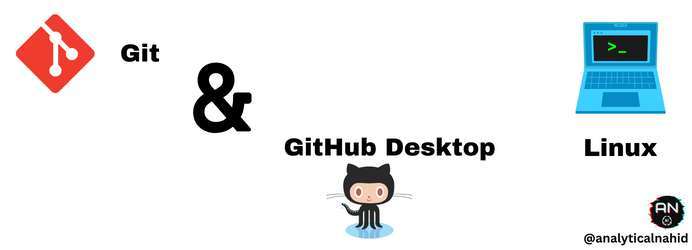How to install Git and GitHub Desktop in Arch Linux
Let’s deep dive into what is Git and GitHub. Before understanding Git you have to understand what is VCS? Let’s take look…

What is VCS?
VCS is an abbreviation for Version Control System. It is a system that enables developers to track changes made to a project’s source code over time and to collaborate with other developers on the same project. This allows developers to easily access and manage different versions of their code, and to collaborate on the development of a project without stepping on each other’s toes. Some examples of version control systems include Git and Subversion.
What is Git and Why it’s important?
Git is a widely-used version control system for tracking changes in computer files and coordinating work on those files among multiple people. It is important because it allows developers to work on a project simultaneously without interfering with each other’s changes, and it provides a way to revert back to earlier versions of the project if necessary. This makes it much easier for teams of developers to collaborate on complex projects, and it helps to ensure that the final product is of high quality.
What is GitHub and Why it’s used for?
GitHub is a web-based platform that provides Git repository hosting, collaboration, and management tools. It is used for a wide range of purposes, but it is particularly popular among software developers who use it to store and manage their source code, track changes, and collaborate with other developers on projects. GitHub also provides tools for project management, issue tracking, and code review, which makes it a valuable resource for teams of developers working on complex projects.
What’s the difference between Git and GitHub?
The main difference between Git and GitHub is that Git is a version control system that is used for managing and tracking changes to files, whereas GitHub is a web-based platform that provides Git repository hosting, collaboration, and management tools. In other words, Git is a tool that is installed on a user’s computer, while GitHub is a website that provides access to Git repositories and other features. You can use Git locally on your own computer to manage version control for your project, or you can use GitHub to collaborate with others and manage your project online.
How to install Git on Linux?
To install git in your system run the below command. It will automatically install git on your system.
sudo pacman -S git -yTo verify the git installation run the following command.
git --versionIt will show the git version installed on your system.
How to install GitHub Desktop?
1. Install Prerequisites:-
To install GitHub Desktop you need to install yay package manager in Arch. Just follow the below command to install yay package manager.
To confirm the the installation of yay package manager just type
sudo yay
in your terminal.
2. Install GitHub Desktop
Once the package manager is installed on your system run following command to install GitHub desktop.
yay -S github-desktop-bin --noconfirm
Note:- Remove –noconfirm to manually go through the installation process instead of selecting the default.
3. Run Docker Desktop
Launch GitHub desktop typing the following command in your terminal
github-desktop
Or
Search GitHub desktop in your search bar.
4. Update GitHub Desktop
Run the following command to update GitHub Desktop
yay -Syu --devel --timeupdate
5. Uninstall GitHub Desktop
The below command will automatically uninstall GitHub desktop from your system.
yay -Rns github-desktop-bin --noconfirm
Congratulations 👏 you have successfully installed Git and Github Desktop on your Linux system.
